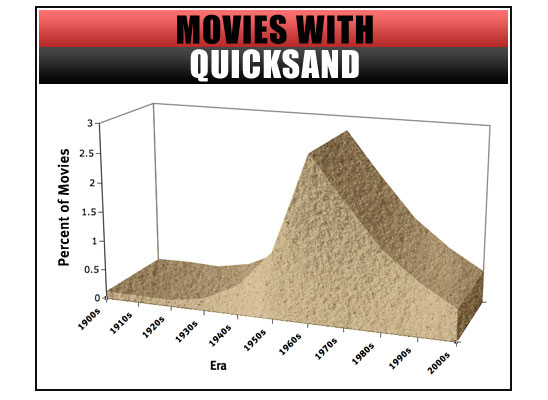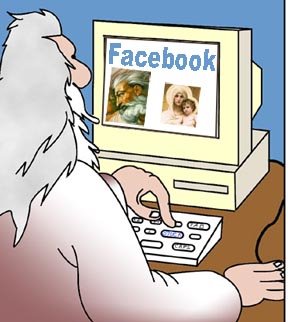
Filling in for DZ (a.k.a Charlie’s Dad!), I’ve dedicated these Week Ends to our tireless defense against spirituality, or, as it will, doubtless, come to be known: gnostosolipsism.
Week Ends to our tireless defense against spirituality, or, as it will, doubtless, come to be known: gnostosolipsism.
1. As Philip Yancey’s article Life in a Bubble attests to, few things illustrate the difficulty and necessity of properly distinguishing law and gospel like Christian educational institutions. Like the church, these organizations are easy targets for unexamined, lazy critiques along the lines of those exposed by PZ in his recent podcast: Green Light (1 & 2). The Law–not “those judgmental people”–is responsible for guilt and shame, and, as such, is not the sole concern of Christian colleges; but, as Yancey points out, sometimes neither is the Gospel. (ht SZ)
2. Slate magazine has an interesting article on the ways the interwebs have allowed those die-hard–wait for it–quicksand enthusiasts to share their love. And you thought the internet was just for serious research. Daniel Engber, from Terra Infirma: the rise and fall of Quicksand, laments:
For  now, quicksand has all but evaporated from American entertainment—rejected even by the genre directors who once found it indispensable. There isn’t any in this summer’s fantasy blockbuster Prince of Persia: Sands of Time or in last year’s animated jungle romp Up. You won’t find quicksand in The Last Airbender or Avatar, either. Giant scorpions emerge from the sand in Clash of the Titans, but no one gets sucked under. And what about Lost—a tropical-island adventure series replete with mud ponds and dangling vines? That show, which ended in May, spanned six seasons and roughly 85 hours of television airtime—all without a single step into quicksand. “We were a little bit concerned that it would just be cheesy,” says the show’s Emmy-winning writer and executive producer, Carlton Cuse. “It felt too clichéd. It felt old-fashioned.”
now, quicksand has all but evaporated from American entertainment—rejected even by the genre directors who once found it indispensable. There isn’t any in this summer’s fantasy blockbuster Prince of Persia: Sands of Time or in last year’s animated jungle romp Up. You won’t find quicksand in The Last Airbender or Avatar, either. Giant scorpions emerge from the sand in Clash of the Titans, but no one gets sucked under. And what about Lost—a tropical-island adventure series replete with mud ponds and dangling vines? That show, which ended in May, spanned six seasons and roughly 85 hours of television airtime—all without a single step into quicksand. “We were a little bit concerned that it would just be cheesy,” says the show’s Emmy-winning writer and executive producer, Carlton Cuse. “It felt too clichéd. It felt old-fashioned.”
3. While we’re on the subject of the power of the Internet,  N+1 has an interesting set of reflections called The Intellectual Situation that will make you feel smarter after reading them. Also, an interview with AS Byatt, author of The Children’s Book–tagline: “I don’t belive in God. I believe in Wallace Stevens”—–contains some provocative observations about her appreciation of the role Facebook and Twitter and the media occupies with respect to that which religion used to play in many people’s lives. Although one may disagree with her conclusions, this is an insightful look into the way in which we are all hard-wired, self-absorbed Gnostics. I’m sure that’s what she meant:)
N+1 has an interesting set of reflections called The Intellectual Situation that will make you feel smarter after reading them. Also, an interview with AS Byatt, author of The Children’s Book–tagline: “I don’t belive in God. I believe in Wallace Stevens”—–contains some provocative observations about her appreciation of the role Facebook and Twitter and the media occupies with respect to that which religion used to play in many people’s lives. Although one may disagree with her conclusions, this is an insightful look into the way in which we are all hard-wired, self-absorbed Gnostics. I’m sure that’s what she meant:)
4. On the topic of Gnostics, Michael Shermer of Skeptic magazine, is having none of Deepak Chopra’s attempt to update classical proofs of God’s existence. Such intellectual consistency among skeptics has to be seen to be believed. I think that they both could have benefited from Christian college.
 5. Not to reincarnate a dead-horse, but if we’re on the topic of quicksand AND Gnostics, I can’t help but mention Lisa Miller’s NYTimes article Remembrances of Lives Past, (ht DZ) which examines the renewed interest in the karmic belief of previous lives. She writes: In one of his past lives, Dr. Paul DeBell believes, he was a caveman. The gray-haired Cornell-trained psychiatrist has a gentle, serious manner, and his appearance, together with the generic shrink décor of his office — leather couch, granite-topped coffee table — makes this pronouncement seem particularly jarring.
5. Not to reincarnate a dead-horse, but if we’re on the topic of quicksand AND Gnostics, I can’t help but mention Lisa Miller’s NYTimes article Remembrances of Lives Past, (ht DZ) which examines the renewed interest in the karmic belief of previous lives. She writes: In one of his past lives, Dr. Paul DeBell believes, he was a caveman. The gray-haired Cornell-trained psychiatrist has a gentle, serious manner, and his appearance, together with the generic shrink décor of his office — leather couch, granite-topped coffee table — makes this pronouncement seem particularly jarring.
You’ve heard it here: this will be covered by the “pastoral clause” of the next Episcopal Prayer Book Revision.
6. Finally, in an interview with CNN entitled  More Teens Becoming “Fake Christians,” something genuinely encouraging in the otherwise depressing reviews/interviews with Kendra Creasy Dean, author of Almost Christian, she writes of Anne Havard:
More Teens Becoming “Fake Christians,” something genuinely encouraging in the otherwise depressing reviews/interviews with Kendra Creasy Dean, author of Almost Christian, she writes of Anne Havard:
There you have it.
Stay classy Mockingbirds.

COMMENTS
6 responses to “Another Week Ends: We Call When All The Cards Stop”
Leave a Reply













OK, Jady, your You Heard It Here prediction was just way too funny. (Though of course you're certain to be right.)
An interesting news story that happened shortly before Jady went to press is Stephen Hawking's preposterous announcement that the universe wasn't created by God.
It's interesting that Lisa Miller's reincarnation story is placed in the "Fashion & Style" section of the NY Times. It informs us that 25% of Americans now believe in reincarnation, and even Julia Roberts is onboard! The article also says of these believers, "They haven't given up on spirituality or religion… they're just tired of the dogma they grew up with." One supposes this Eastern dogma is fresher and more exciting – you might even say it's more "stylish and fashionable."
Oh, and just for the record, unless I've missed something, A.S. Byatt isn't a children's author. She has a new novel out called "The Children's Book," which may have led to confusion!
Margaret,
Thanks for the correction!
Margaret, your comment about reincarnation, fashion, and style was one of the more penetrating I have read in a while.
Thanks, StampDawg. I aims to penetrate 🙂 Seriously, though… I've been troubled by this trend. I remember when I first read "Eat, Pray, Love," a few years ago, being annoyed that Elizabeth Gilbert had gone on this big "spiritual quest" – her stated purpose being to "find God" – and had started in Italy, where she did nothing but explore the cuisine. Right there in the shadow of the Sistene Chapel, St. Peter's Basilica, et. al., she did nothing but eat. Not a speck of curiosity about Christianity, the faith in which she was raised. At this point, she had already rejected it, but not based on any study or rigorous thought… she just wasn't interested. It was exiting and life-changing to re-examine her preconceptions about food, but Christianity didn't merit the same attention? After her food binge, she traipses off to an ashram in India to REALLY start looking for God.
I remember she said, early in the book, that her friends in New York were always teasing her about her "God thing." They thought she was crazy for being interested in the concept of God at all. I got the impression that going the Eastern route was a way of avoiding what has become, in many circles, a real stigma… or, at least, profoundly uncool. Christianity just has so much baggage – from the scientific "evidence" against it to the never-ending "culture wars," etc.
I was at a party last night, with a bunch of artists and journalists (of which I am one), and a guy I didn't know was talking about a "weird" wedding he'd just attended – both the bride AND the groom's fathers were preachers, and both had participated in the service. I asked him what kind of service it was, and he replied, "Oh, who knows? Presbyterian, or something… It's all the same to me. All I know is that there were no booze at the reception!" I said, "That doesn't sound Presbyterian. I'm a Presbyterian, and we like our booze!" He looked at me as if I'd just told him I was a space alien. He was fascinated. He said, "Do you actually go to church and everything?" I said, "Yep. I sing the choir, too. We did an amazing anthem this morning. Psalm 139." He was just blown away… Couldn't believe somebody cool enough to be at this party had actually been sitting in a Presbyterian church that very same day. In a choir robe! He seemed deeply unsettled by the idea and the conversation came to an awkward halt. I have absolutely no doubt that if I'd told him I was a Buddhist, he'd have found that information either completely unremarkable, or interesting in a GOOD way. Sexy and cool. As it stood… he just thought I was weird.
Rock on, Margaret E, rock on! If the world only had more Presbyterians like you…